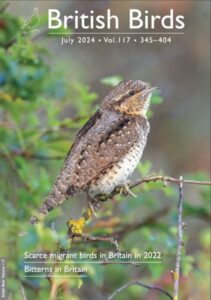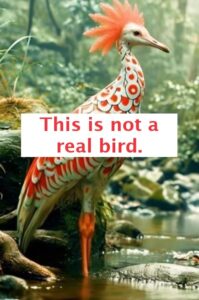 The July 2024 issue of British Birds contains a particularly timely and important essay that I very much recommend by Stephen Menzie with the self-explanatory title of “AI-generated images and their impact on birding.” As this topic has been on my mind for the past few months now, ever since noticing the proliferation of such images of clearly fictional birds presented as real on a rapidly increasing number of social media pages created for the purpose, particularly on Facebook, I was delighted to see such an important journal as British Birds taking up the topic. While Mr. Menzie fixes his main line of enquiry in the essay on the potential risks to documentation of observed birds in official ornithological records as well as the more mundane difficulties it can cause in popular media (both illustrated by clearly identified visual examples), my own concern originally sprang from the sheer number of people who seemed not only to be subscribing to the Facebook pages publishing such AI-generated images of birds but unquestionably believing that they were real.
The July 2024 issue of British Birds contains a particularly timely and important essay that I very much recommend by Stephen Menzie with the self-explanatory title of “AI-generated images and their impact on birding.” As this topic has been on my mind for the past few months now, ever since noticing the proliferation of such images of clearly fictional birds presented as real on a rapidly increasing number of social media pages created for the purpose, particularly on Facebook, I was delighted to see such an important journal as British Birds taking up the topic. While Mr. Menzie fixes his main line of enquiry in the essay on the potential risks to documentation of observed birds in official ornithological records as well as the more mundane difficulties it can cause in popular media (both illustrated by clearly identified visual examples), my own concern originally sprang from the sheer number of people who seemed not only to be subscribing to the Facebook pages publishing such AI-generated images of birds but unquestionably believing that they were real.

Of course, I realize that in the world of social media, nothing is necessarily as it seems. Such pages are often nothing but various schemes, often produced and maintained by “click farms,” that are later to be renamed and sold to an entirely unrelated entity – not uncommonly politicians, political cause groups, and celebrities – pre-packaged with hundreds of thousands of “followers.” Of course, it’s entirely possible, and indeed likely, that a large portion of those identified as following the pages and “liking” their published content are not real either but yet another layer of the massive shell-game that social media has become.
As one who has dedicated decades of his life to helping people learn about, understand, and as a result – it is hoped – care more about the natural world and the present state it is in, I am particularly troubled by such AI-generated images as they present the unreal as real, leading any actual humans seeing them and not understanding that they are nothing more than the random collection of data assembled into visual images by an AI image-generating computer program to develop an unrealistic expectation of how the natural world truly appears. As has been discovered from research into compulsive viewing of pornography and its effects of decreasing both the interest in and function of men with such a compulsion during actual sexual activity, I am very concerned that with the proliferation of AI-generated images of birds, as well as other natural history subjects, that the “more real than real” visual images will result in a desensitization and disinterest in people when they see actual birds and other wildlife in either authentic images or in real life.
Ours is a world in which too many people are increasingly detached from the natural world, and even among those who hold a nascent interest in it, the general systems of education in many countries, particularly the United States, are deteriorating rapidly in the amount of time and attention they give to teaching young people about nature. To this is then added the lack of time now allowed for them to explore it on their own, and the willingness of parents and other adults to put a mobile phone or digital tablet into their hands so they can watch an endless string of cartoons (at best) and stay quiet and out-of-the-way. Additionally, as too many of us now disappear into our mobile phones for our information and entertainment, we are dangerously at risk of forgetting to look up at what is actually around us everyday and increasingly in danger of failing to be able to appreciate it in its glorious spectacles as well as its sublime subtleties. Conditioning people to expect it to be a kaleidoscopic never-ending parade of brightly coloured, fantastical creatures only compounds these problems and it needs to stop.
If you enjoyed reading this, please consider signing up for The Well-read Naturalist's newsletter. You'll receive a helpful list of recently published reviews, short essays, and notes about books in your e-mail inbox once each fortnight.
